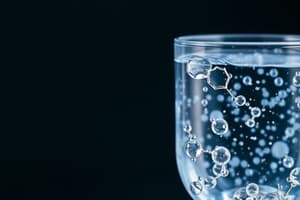Podcast
Questions and Answers
What is the significance of the hydrogen bond according to Linus Pauling?
What is the significance of the hydrogen bond according to Linus Pauling?
The significance of the hydrogen bond for physiology is greater than that of any other single structural feature.
What percentage of the weight of most organisms is made up by water?
What percentage of the weight of most organisms is made up by water?
- 70% (correct)
- 30%
- 50%
- 90%
Nonpolar biomolecules dissolve readily in water.
Nonpolar biomolecules dissolve readily in water.
False (B)
What are the weak interactions that significantly influence the structures of biomolecules?
What are the weak interactions that significantly influence the structures of biomolecules?
What unusual properties does water have compared to most common solvents?
What unusual properties does water have compared to most common solvents?
What shape does the geometry of the water molecule resemble?
What shape does the geometry of the water molecule resemble?
Water has a bond angle of _____ degrees.
Water has a bond angle of _____ degrees.
Flashcards
Hydrogen bond (significance)
Hydrogen bond (significance)
A crucial intermolecular attraction in biological systems, more significant than other structural features.
Water's abundance
Water's abundance
Water comprises a large percentage (70% or more) of most living organisms.
Water's role in evolution
Water's role in evolution
Water's properties significantly influenced the development of life.
Polar biomolecule solubility
Polar biomolecule solubility
Signup and view all the flashcards
Nonpolar biomolecule solubility
Nonpolar biomolecule solubility
Signup and view all the flashcards
Water properties (unusual)
Water properties (unusual)
Signup and view all the flashcards
Water's internal cohesion
Water's internal cohesion
Signup and view all the flashcards
Hydrogen Bonding
Hydrogen Bonding
Signup and view all the flashcards
Water's role in biomolecule structures
Water's role in biomolecule structures
Signup and view all the flashcards
Hydrogen bonding influence on biomolecules
Hydrogen bonding influence on biomolecules
Signup and view all the flashcards
Study Notes
Water
- Water is the most abundant substance in living organisms, comprising 70% or more of their weight
- Early life likely originated in an aqueous environment
- Water's properties (e.g., attractive forces, ionization tendencies) deeply affect biomolecules' structure and function
- Water molecules are polar, enabling them to form hydrogen bonds with each other and solutes
- Hydrogen bonds are relatively weak (23 kJ/mol) compared to covalent bonds (470 kJ/mol) but still very influential
- Hydrogen bonding leads to water's high melting point, boiling point and heat of vaporization compared to other solvents
- Water molecules cluster together in ice forming a crystal lattice, causing ice to be less dense than liquid water
- Water dissolves salts (e.g., NaCl) by hydrating ions, weakening electrostatic attraction and making them soluble
- The dielectric constant of water (78.5 at 25°C) screens electrostatic interactions between dissolved ions
- Nonpolar molecules cluster together in water
- Water's ability to form hydrogen bonds with itself and solutes influences solute solubility
- The ordering (reduced entropy) of water surrounding nonpolar solutes is energetically unfavorable
Weak Interactions in Aqueous Systems
- Hydrogen bonds between water molecules provide cohesive forces, making water a liquid at room temperature
- Water's unique properties are crucial to life
- Weak interactions (hydrogen bonds, ionic, hydrophobic, and van der Waals) determine the three-dimensional structures of biological molecules (e.g., proteins, nucleic acids)
- These weak interactions collectively significantly influence biological molecules' structures contributing to their strength, flexibility and precise shapes
- Water's ability to form hydrogen bonds with polar solutes facilitates the solubility of polar biomolecules
- The strength of hydrogen bonds is determined by the orientation of the molecules, maximizing electrostatic attraction when the molecules are in line
Ionization of Water, Weak Acids, and Weak Bases
- Water ionizes slightly into H⁺ and OH⁻ ions.
- The ionization of water is an equilibrium reaction expressed by a constant (K)
- Water's ionization is significant because it contributes to the pH of solutions.
- Weak acids and bases also ionize in water, influencing the pH.
- Equilibrium constants describe the proportion of reactants compared to products in an equilibrium reaction
- Equilibrium constants can be calculated from the concentrations of reactants and products at equilibrium,
- The ionization of water is expressed by an equilibrium constant (K)
- The product of [H⁺] and [OH⁻] in water is called K_w, which has a constant value at a given temperature
- The pH scale measures hydrogen ion concentration
- Changes in pH can affect the structure and function of biomolecules.
Studying That Suits You
Use AI to generate personalized quizzes and flashcards to suit your learning preferences.




